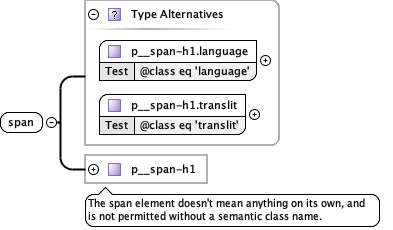Diagram
Properties
content
complex
mixed
true
Children a br cite em i ruby span strong sub sup u
Instance
<span class= "" itemprop= "" itemscope= "" itemtype= "" >
<a class= "" itemprop= "" itemscope= "" itemtype= "" > {1,1} </a>
<br > {1,1} </br>
<em itemprop= "" itemscope= "" itemtype= "" > {1,1} </em>
<cite itemprop= "" itemscope= "" itemtype= "" > {1,1} </cite>
<i itemprop= "" itemscope= "" itemtype= "" > {1,1} </i>
<sub > {1,1} </sub>
<sup class= "" > {1,1} </sup>
<strong itemprop= "" itemscope= "" itemtype= "" > {1,1} </strong>
<u class= "" itemprop= "" itemscope= "" itemtype= "" > {1,1} </u>
<ruby > {1,1} </ruby>
<span class= "" itemprop= "" itemscope= "" itemtype= "" > {1,1} </span>
</span>
Attributes
QName
Type
Use
Annotation
class union of(uppercase language small-caps translit verse-number dominant subordinate
optional
itemprop xs:string optional
"property-name" — adds a property to a microdata item. The name of the property can be a word or URL, and the value is the ‘content’ of the element with this attribute.
itemscope restriction of xs:string
optional
Defines a group of name-value pair(s), called an item
itemtype xs:anyURI optional
defines the item’s type when used on the same element as itemscope. The itemtype value is a URL that acts as an identifying vocabulary name.

